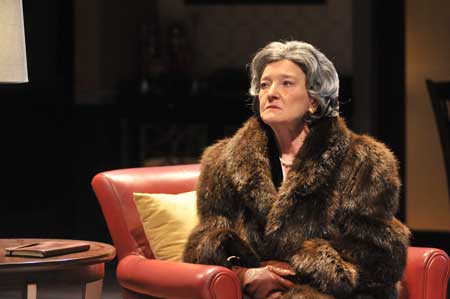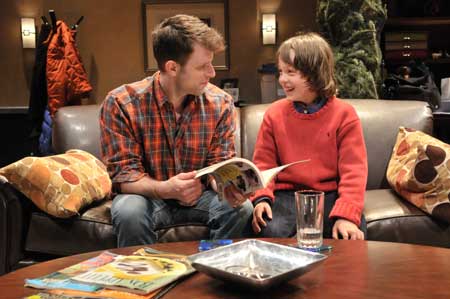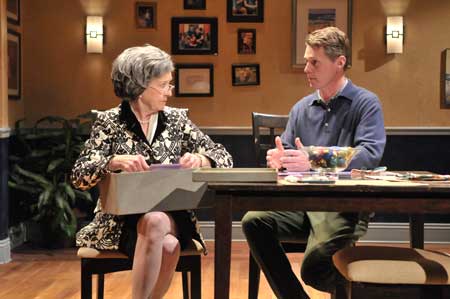Play (2013)
by Terrence McNally
Directed by Paul Daigneault
SpeakEasy Stage Company
Boston Center for the Arts
South End, Boston
May 8 – June 6, 2015
With Nancy E. Carroll (Katharine Gerard), Nile Hawver (Will Ogden), Michael Kaye (Cal Porter), Liam Lurker (Bud Ogden-Porter)

in “Mothers and Sons”
Photo: Craig Bailey/Perspective Photo
Courtesy of Speakeasy Stage Company
Taking off with a bang, this wonderfully acted and directed account of the surviving mother of an AIDS victim hits hard, is relentlessly tough, and rattles the cage of judgment and isolation until the walls ring.
Nancy E. Carroll (Katharine Gerard), long-time Boston actor, has never been better. She is tight-lipped but brimming with contained emotion that reverberates and echoes.
Katharine spurned her son, horrified by his homosexuality, and distanced herself from his lifestyle and disease. Yet here, clearly and resolutely, Carroll’s superbly restrained yet abundantly felt account of Katharine demonstrates, through peeks and cracks, exactly how much she seeks to repent and to connect.
The former lover of her dead son, Cal (Michael Kaye), now middle-aged, is forthright, determined, articulate, and bears with decorum the resentment of one who has survived great loss in the face of judgement and scorn.

Liam Lurker as Bud Ogden-Porter
in “Mothers and Sons”
Photo: Craig Bailey/Perspective Photo
Courtesy of Speakeasy Stage Company
His younger husband, Will (Nile Hawver), is surprised, threatened, outraged, and parentally attentive in turns, trying desperately to be gracious to Katharine while quibbling with Cal and running after their son Bud (Liam Lurker).
Liam Lurker, himself a young boy, gives a remarkably effective account of Bud, holding his own throughout to the very end when he must carry the delicate and loaded words in the final scene in which he instructs Katharine how to eat Oreos. (It sounds mundane, but it is everything but.) Carrying this off is a remarkable achievement for this young actor.
The play itself is taut and compelling overall, though there are some transitions where particular evocations don’t fit with the general tone.
Will complains to Cal in the interstices during Katharine’s visit, insecure about their relationship in light of Cal’s past relationship with Andre, Katharine’s son. This represents a little too much anguished melodrama in the context of the wonderfully restrained tenor of much of the rest of the drama. As well, though heartfelt, Katharine’s psychological revelation about herself is, in light of that superb restraint in the writing of her character and in Carroll’s beautifully controlled interpretation of it, too far over the top. Innuendo rather than outpouring would have made more sense.
An engrossing precis of changing attitudes about homosexuality, gay marriage and AIDS over the past thirty years, the play offers a poignant review of social change during that time. As well, it offers a concrete sense of the deep sense of tragedy that surrounds the loss of those who died before the currently available sophisticated and effective drug treatments were discovered.

Michael Kaye as Cal Porter
in “Mothers and Sons”
Photo: Craig Bailey/Perspective Photo
Courtesy of Speakeasy Stage Company
But, more than that, the play is an existential one, a look at the issue of loneliness and despair embodied in the now completely alone Katharine. Clearly, social judgement often masks personal frustrations that often do not reveal themselves until much damage has been done. Loneliness brought on by that insistent distancing is, as this drama so vividly demonstrates, the cruelest joke, the sorry capstone to a life lived out of bitter contempt.
The curiosity of McNally’s treatment is in its gentle compassion for the perpetrator. He renders to her, in this case, the opportunity not only to repent, but to realize that the world she has scorned is the very one from which she might have drawn sustenance. Where we think we least find meaning, that from which we define ourselves in horrified alienation, becomes that which subsequently offers itself to us. In this sense, the play is about redemption, about connection in spite of oneself, offering of a path of return, however oddly distant it might seem.
This production by the Speakeasy Stage is first-rate. Carroll offers a bravura performance, tight, controlled, but replete with feeling seemingly ready to burst. Her three male counterparts do a superb job of framing that desperate and ailing character and offering a sense of the world she has, and might almost totally, have missed.
– BADMan
Leave a Reply